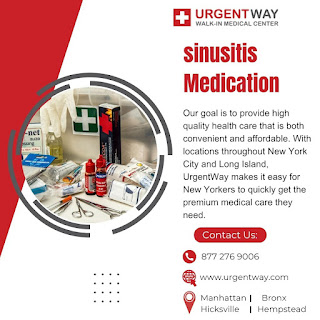Can sinusitis medicine help prevent future sinus infections, or is it primarily used for symptom management?
Can sinusitis medicine help prevent future sinus infections, or is it primarily used for symptom management?
Introduction:
Millions of
people around the world suffer from sinusitis, which is characterized by
inflammation of the sinus cavities. Sinusitis symptoms, such as nasal
congestion, facial pain and pressure, can have a substantial influence on a
person's quality of life. While sinusitis medications are commonly used to
relieve symptoms, there is ongoing disagreement about whether they can also
help prevent posterior sinus infections. This article examines the
effectiveness of sinusitis medications in preventing recurrent sinus
infections, as well as their primary purpose in controlling symptoms.
Understanding sinusitis:
Before
delving into the role of sinusitis medications in prevention and treatment, it
is essential to understand the underlying causes and mechanisms of sinusitis.
Sinusitis can be acute, lasting a few weeks, or chronic, persisting for more
than twelve weeks despite medical treatment. Sinusitis is commonly caused by
viral infections, bacterial infections, allergies, anatomical abnormalities,
and environmental factors.
Control symptoms with sinusitis
medications:
Sinusitis
medications include a wide range of therapy options aimed at relieving symptoms
and reducing inflammation. These include both over-the-counter (OTC)
pharmaceuticals, such as decongestants, antihistamines, and pain relievers, and
prescription medications such as corticosteroids, antibiotics, and nasal
sprays. Each medication is designed to treat different sinusitis symptoms and
underlying causes.
Decongestants
work by constricting the blood vessels in the nasal passages, which reduces
swelling and congestion. Antihistamines help reduce allergy symptoms such as
sneezing and itching. Pain relievers such as ibuprofen or paracetamol can help
with facial pain and headaches. Corticosteroids suppress inflammation of the
nasal passages, while antibiotics treat bacterial sinus infections.
While these
medications are helpful in treating symptoms, their primary goal is to provide
relief rather than prevent future sinus infections. They do not treat the
underlying causes of sinusitis or improve the body's immune response to
recurrent infections.
Preventive strategies and lifestyle
changes:
People can
take preventive measures and make lifestyle changes to complement sinus
medications and reduce the risk of repeat infections. This may include:
Practice excellent hygiene: Washing your hands frequently can
help prevent the spread of viruses and bacteria that cause sinus infections.
Use a humidifier: Adding moisture to the air can help
soothe sensitive nasal passages and prevent them from drying out, reducing the
risk of infection.
Avoid irritants: Cigarette smoke, air pollution, and
strong odors can worsen sinusitis symptoms and increase the risk of infection.
Allergies
can cause inflammation of the sinuses and lead to sinusitis. Identifying and
avoiding allergens, or taking allergy medications, can help prevent sinus
infections.
Nasal irrigation: Rinsing the nasal passages with
saline can remove mucus and irritants, reducing congestion and lowering the
risk of infection.
While these preventive measures can help reduce the frequency and severity of sinus infections, they may not completely eliminate the need to take sinus medications, especially in people prone to recurrent infections or with sinusitis. chronicle.
The role of sinusitis medicine in
prevention:
While
sinusitis medications focus primarily on symptom control, some medications can
indirectly help prevent future sinus infections by reducing inflammation,
clearing the nasal passages, and promoting sinus drainage. Nasal sprays with
corticosteroids, for example, can help reduce inflammation of nasal tissues and
improve airflow, making it easier to drain mucus from the sinuses. By reducing
inflammation and promoting drainage, these medications can create a less
hospitable environment for bacteria to thrive, reducing the risk of secondary
bacterial infections.
Similarly,
antibiotics prescribed for acute bacterial sinusitis can effectively treat
existing infections and prevent them from worsening or coming back. However,
excessive or incorrect use of antibiotics can lead to antibiotic resistance and
may not be suitable for cases of viral or uncomplicated sinusitis.
Sinus Infection Doctor At UrgentWay
Walk-In Clinic:
Sinusinfection treatment is available at all UrgentWay locations. We are open seven
days a week from morning to evening, allowing you to visit us
whenever convenient. Our experienced providers will assess your
condition, advise the best sinus infection treatment accordingly, and counsel
you on preventative care.
Conclusion:
Sinusitis
treatment is essential to treat symptoms and provide relief to anyone suffering
from acute or chronic sinusitis. While these medications are generally used to
treat symptoms, some may indirectly help prevent recurring sinus infections by
reducing inflammation, increasing drainage, and treating underlying bacterial
infections. However, preventative interventions, lifestyle changes, and
addressing underlying causes are still necessary to reduce the risk of
recurrent sinus infections. People who understand the limitations and potential
benefits of sinusitis medications can make more informed treatment decisions
and take proactive steps to maintain sinus health.
.png)



Comments
Post a Comment